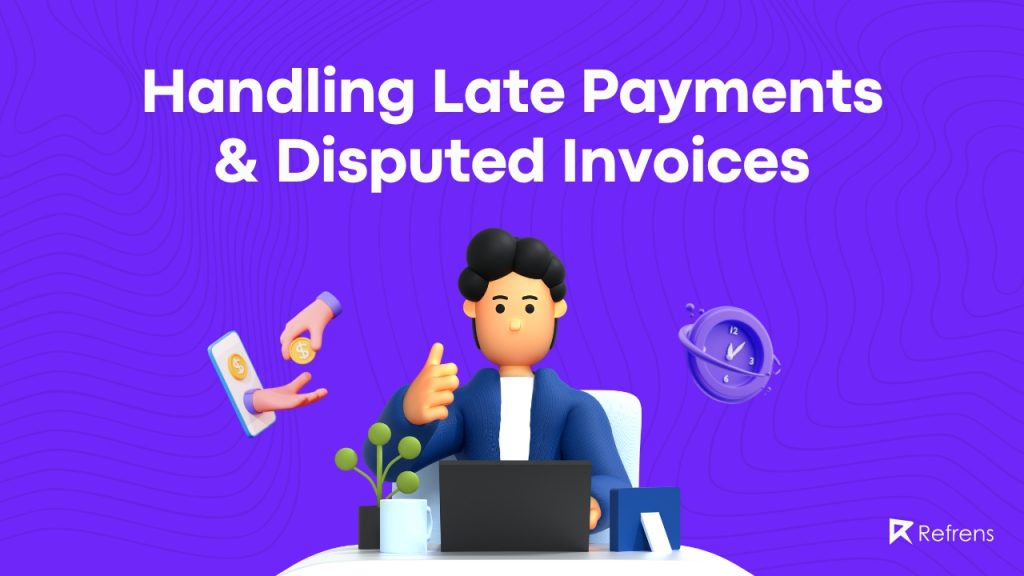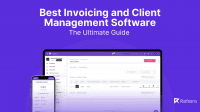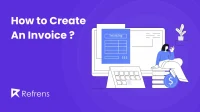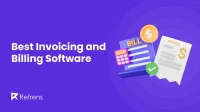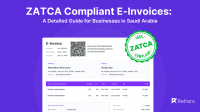Dealing with late payments and invoice disputes can be one of the most challenging aspects of managing a business. Not only do these issues disrupt cash flow, but they can also strain client relationships and increase administrative work.
In this comprehensive guide, we will outline proven strategies for handling late payments and disputed invoices, as well as explore incentives to encourage clients to pay their invoices early. By implementing these techniques, you can improve your cash flow, strengthen client relationships, and focus on growing your business.
Strategies For Handling Late Payments & Disputed Invoices
1. Establish A Clear Late Payment Policy
Include a late payment policy in your initial contract or agreement, outlining the consequences of late payments, such as interest charges or late fees. This helps set expectations and provides a basis for addressing late payments.
2. Be Proactive With Payment Reminders
Send friendly payment reminders to clients before the invoice due date to encourage timely payments. For overdue invoices, follow up with a more assertive reminder that includes the late payment policy and any additional fees incurred.
Refrens’ invoicing software lets you automate the entire process of sending reminders to your clients so you don’t have to!
3. Communicate Professionally
When discussing late payments or payment disputes, maintain a professional tone and avoid becoming confrontational. Open and respectful communication can help preserve your business relationship and facilitate resolution.
4. Listen To Your Client’s Perspective
When a dispute arises, listen carefully to your client’s concerns and try to understand their perspective. This can help you identify the root cause of the issue and work towards a resolution.
Learn 6 reasons why clients don’t pay on time and how to deal with it >
5. Offer Flexible Payment Solutions
In some cases, clients may be experiencing financial difficulties. Be willing to work with them by offering flexible payment options, such as extended payment terms or a payment plan, to help them fulfill their obligations.
6. Be Proactive In Preventing Disputes
Minimize the likelihood of disputes by clearly defining the scope of work, deliverables, and payment terms in your initial agreement or contract. Ensure your invoices are accurate, detailed, and easy to understand
7. Offer A Fair Resolution
After evaluating the dispute and considering both perspectives, propose a fair resolution that addresses the client’s concerns while also protecting your business interests. This might involve adjusting the invoice amount, offering a partial refund, or providing additional services.
8. Gather Supporting Documentation
Collect any relevant documentation, such as contracts, email correspondence, or project records, to support your position in the dispute. This evidence can be helpful in clarifying misunderstandings or resolving conflicts.
9. Escalate The Issue When Necessary
If a client consistently fails to make payments or respond to communication, consider escalating the issue. This may involve hiring a debt collection agency, taking legal action, or reporting the debt to credit bureaus. Evaluate the cost and potential impact on your business before proceeding with these measures.
10. Learn From The Experience
Analyze each late payment or payment dispute situation to identify potential improvements in your invoicing process or client screening procedures. Implement changes to minimize the likelihood of similar issues arising in the future.
11. Protect Yourself With A Solid Contract
Ensure your contracts clearly outline payment terms, deliverables, and dispute resolution processes. A well-drafted contract can help prevent payment disputes and provide a framework for resolving issues that may arise.
12. Offer Early Payment Incentives
Encourage clients to pay their invoices early by offering discounts or other incentives for prompt payment. This can help improve your cash flow and reduce the time spent chasing payments.
13. Consider Involving A Third Party
If the dispute cannot be resolved through direct communication, consider involving a neutral third party, such as a mediator or arbitrator, to help facilitate a resolution.
14. Know When To Walk Away
In some cases, it may be more cost-effective to write off the disputed amount rather than invest significant time and resources in pursuing a resolution. Evaluate the potential impact on your business and make a decision based on your specific circumstances.
Recommended Reads: Best Invoice Approval Workflow Software
Recommended Reads: Best CRM Software with Invoicing
Determining Late Payment Charges to Encourage Timely Payments
Late payments can negatively impact your business’s cash flow, making it crucial to have a system in place to encourage clients to pay their invoices on time. Implementing late payment fees and interest charges can help discourage late payments and compensate for the additional administrative work involved in managing overdue invoices.
Here’s how to determine and implement these charges:
1. Establish A Clear Payment Policy
Before implementing late payment fees or interest charges, establish a clear payment policy that outlines your expectations for payment terms and due dates. This policy should be communicated to clients before engaging in business and be included in your contracts and agreements.
2. Set Reasonable Payment Terms
Ensure that the payment terms you set for your clients are reasonable and in line with industry standards. For example, a 30-day payment term is a common practice for many businesses. Be flexible and consider offering different payment terms to accommodate clients’ specific needs or situations.
3. Offer A Grace Period
Consider offering a short grace period before applying late payment fees or interest charges. This shows goodwill and flexibility and may encourage clients to pay promptly even if they miss the initial due date.
4. Determine Late Payment Fees
Late payment fees can be either a fixed amount or a percentage of the outstanding invoice balance. A fixed fee can be simpler to implement, but a percentage-based fee may be more effective at encouraging timely payments for larger invoices. Be sure to research any legal limitations or restrictions on late fees in your jurisdiction, and set a fee that is fair and reasonable.
5. Calculate Interest Charges
If you decide to implement interest charges on overdue invoices, you will need to determine the appropriate interest rate. Research the legal maximum allowable interest rate for overdue payments in your jurisdiction, as well as industry standards. You can use an annual percentage rate (APR) and divide it by 365 to calculate a daily interest rate, which can then be applied to the outstanding invoice balance for each day it remains unpaid.
6. Include Late Payment Terms On Invoices
Clearly state your late payment fees and interest charges on your invoices. Include a notice that informs clients of the consequences of late payments, such as additional fees or interest charges, and specify when these charges will be applied (e.g., after the due date).
7. Communicate & Enforce Your Late Payment Policy
Ensure that your clients are aware of your late payment policy and the potential consequences of not paying on time. Politely remind clients of upcoming due dates and follow up with a friendly reminder if a payment becomes overdue. If a client continues to delay payment, consider enforcing the late payment fees and interest charges as outlined in your policy and agreed-upon contracts.
8. Be Open To Communication & Negotiation
Sometimes, clients may have valid reasons for late payments, such as financial difficulties or administrative errors. Be open to communication and negotiation, and consider waiving late payment fees or interest charges on a case-by-case basis if clients demonstrate a genuine effort to resolve the issue.
By implementing late payment fees and interest charges, you can encourage clients to pay their invoices on time, improve your cash flow, and compensate for the additional effort involved in managing overdue payments. Be sure to communicate your late payment policy clearly and consistently, and always strive to maintain a professional and respectful relationship with your clients, even when dealing with late payments.
But if you want to use a proactive measure, you can use strategies like early payment discounts to ensure that you get paid on time. let’s understand that in detail.
Recommended read: Invoice like a pro: A comprehensive invoicing guide >
Recommended Reads: Top 8 e-Way Bill Software
Recommended Reads: Top 7 Invoice Generator Software
Offering Incentives To Get Your Clients to Pay Their Invoices Early
Encouraging clients to pay their invoices early can improve your cash flow, reduce administrative work, and strengthen your client relationships. Offering discounts and early payment incentives can be an effective strategy for achieving this goal.
Here are some strategies for implementing these incentives in your invoicing process:
1. Early Payment Discounts
An early payment discount is a percentage reduction in the invoice amount if the client pays their invoice before the due date. For example, you could offer a 2% discount if the client pays within 10 days of the invoice date. Clearly state the discount terms on your invoices and explain the conditions under which the discount can be applied.
2. Tiered Discounts
Consider offering tiered discounts based on different payment timeframes. For example, you could offer a 3% discount for payments made within 7 days, 2% for payments made within 14 days, and 1% for payments made within 21 days. This approach provides clients with more flexibility and encourages them to pay as early as possible to maximize their savings.
3. Volume-based Incentives
If you work with clients on an ongoing basis, consider offering volume-based incentives. For example, you could provide a discount on future invoices if the client consistently pays early or reaches a certain volume of work or payments within a specific time frame.
4. Customized Incentives
Some clients may value non-financial incentives more than discounts. For example, you could offer priority support, expedited services, or exclusive access to new products or features for clients who consistently pay their invoices early.
5. Communicate The Benefits Of Early Payments
Educate your clients about the benefits of early payments, both for their business and yours. By paying early, clients can save money, reduce administrative work, and strengthen their relationship with your company. Emphasize these benefits in your communications and marketing materials.
6. Make It Easy To Pay Early
Ensure that your invoicing and payment systems are user-friendly and efficient, making it easy for clients to pay their invoices early. Provide multiple payment options and ensure your clients have all the necessary information to complete their payments quickly and easily.
7. Track & Reward Early Payers
Keep track of clients who consistently pay their invoices early and acknowledge their efforts. Send personalized thank-you notes, provide small gifts or tokens of appreciation, or mention their prompt payments in meetings or conversations. This can help build positive relationships and encourage clients to continue paying early.
8. Regularly Review & Adjust Your Incentives
Monitor the effectiveness of your early payment incentives and adjust them as needed to maximize their impact. Analyze your clients’ payment patterns, gather feedback, and stay informed about industry trends and best practices to ensure your incentives remain competitive and effective.
By offering discounts and early payment incentives, you can encourage clients to pay their invoices early and enjoy the benefits of improved cash flow and reduced administrative work. Tailor your incentives to your client’s needs and preferences, and always strive to maintain clear communication and strong relationships to ensure long-term success.
In conclusion, managing late payments and disputed invoices effectively is essential for the financial health and success of your business. By establishing clear policies, maintaining open communication, and offering incentives for early payments, you can encourage clients to settle their invoices promptly and reduce the likelihood of future disputes.
Implementing these strategies will not only improve your cash flow but also foster stronger client relationships and a more efficient invoicing process. By proactively addressing these challenges, you can minimize the impact of late payments on your business and focus on what you do best – delivering exceptional products and services to your clients.
Also read:
15 Best Invoicing Software
Top E-Invoicing Software in India: Detailed Analysis
Top 10 Inventory Invoice Software
Top 10 Billing Software For Chartered Accountants
Top Invoicing Software For Consultants
Billing Software For Export Business
Top 10 Accounting Software
Top Locksmith Invoice software
The Ultimate Guide to the Best Invoicing and Client Management Software
